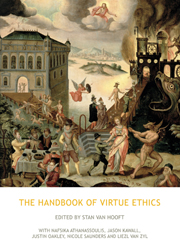Book contents
- Frontmatter
- Contents
- Acknowledgements
- 1 Introduction
- PART I NORMATIVE THEORY
- PART II TYPES OF VIRTUES
- PART III APPLIED ETHICS
- PART IV THE PSYCHOLOGY OF VIRTUE
- 35 Constancy, fidelity and integrity
- 36 Sympathy
- 37 The problem of character
- 38 Situationism and character: new directions
- 39 Educating for virtue
- 40 Literature, arts and the education of virtuous emotion
- 41 Virtue ethics for skin-bags: an ethics of love for vulnerable creatures
- Contributors
- References
- Index
38 - Situationism and character: new directions
from PART IV - THE PSYCHOLOGY OF VIRTUE
- Frontmatter
- Contents
- Acknowledgements
- 1 Introduction
- PART I NORMATIVE THEORY
- PART II TYPES OF VIRTUES
- PART III APPLIED ETHICS
- PART IV THE PSYCHOLOGY OF VIRTUE
- 35 Constancy, fidelity and integrity
- 36 Sympathy
- 37 The problem of character
- 38 Situationism and character: new directions
- 39 Educating for virtue
- 40 Literature, arts and the education of virtuous emotion
- 41 Virtue ethics for skin-bags: an ethics of love for vulnerable creatures
- Contributors
- References
- Index
Summary
THE SITUATIONIST CRITIQUE OF CHARACTER IN BRIEF
Virtue ethics has developed as a type of theoretical alternative to deontology and consequentialism (e.g. Hursthouse 1999; Swanton 2003; Adams 2006; Russell 2009; Annas 2011). It takes virtue to be the primary concept of ethical concern, as opposed to rules (deontology) and consequences (consequentialism). Traditionally, virtue is thought to be a type of global or robust trait implicated in producing regular behaviour across many different types of situations. Thus, according to virtue ethicists, if someone possesses the virtue of courage, she can be expected to be courageous in many different kinds of situations – on the battlefield, when facing serious illness, in standing up against prejudice, in blowing the whistle on corruption, and so on. Good character, for virtue ethicists, is a constellation of coherently organized virtues, which are thought to be deeply entrenched in the fabric of personality. In a person of good character, the virtues work together harmoniously, and, in some versions of virtue ethics (e.g. Hursthouse 1999; Annas 2011), are necessary for happiness or flourishing.
Harman (1999, 2000), Doris (1998, 2002, 2005) and Merritt (2000) use social psychological studies to critique virtue ethics and the conception of character central to it. Known as “situationism”, their critique takes several forms, but all include the claim that empirical psychology provides overwhelming reason to think that situations, and not global or robust traits, are the main factors that influence behaviour.
- Type
- Chapter
- Information
- The Handbook of Virtue Ethics , pp. 430 - 439Publisher: Acumen PublishingPrint publication year: 2013

